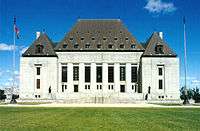Singh v Canada (Minister of Employment and Immigration)
| Singh v Canada (Minister of Employment and Immigration) | |
|---|---|
|
| |
| Hearing: April 30, May 1, 1984 Judgment: April 4, 1985 | |
| Citations | [1985] 1 S.C.R. 177 |
| Docket No. | 17904 |
| Court Membership | |
|
Chief Justice: Brian Dickson Puisne Justices: Roland Ritchie, Jean Beetz, Willard Estey, William McIntyre, Julien Chouinard, Antonio Lamer, Bertha Wilson, Gerald Le Dain | |
| Reasons given | |
| Majority | Wilson J. (paras. 1-80), joined by Dickson C.J. and Lamer J. |
| Concurrence | Beetz J. (paras. 81-126), joined by Estey and McIntyre JJ. |
Singh v Canada (Minister of Employment and Immigration), [1985] 1 S.C.R. 177 is a 1985 case of the Supreme Court of Canada.
Between 1977 and 1980, Harbhajan Singh, five other Sikh foreign nationals and one from Guyana attempted to claim convention refugee status under the Immigration Act, 1976 on the basis that they had a well-founded fear of persecution in their home country. They were denied status by the Minister of Employment and Immigration on the advice of the Refugee Status Advisory Committee.
The seven foreign nationals challenged the adjudication procedures under the Immigration Act on the basis that it violated section 7 of the Canadian Charter of Rights and Freedoms and violated section 2(e) of the Canadian Bill of Rights. The government claimed that since they had no status within the country they were not subject to the Charter.
Opinion of the Court
All 6 Justices (Ritchie J. not taking part in the judgment) agreed to allow the appeal. The Court found that the seven foreign nationals were protected by the Charter and their rights had been violated. Justice Bertha Wilson (writing on behalf of Dickson C.J. and Lamer) wrote the decision based on section 7 rights to security of person and fundamental justice. She also found the government's claim that giving hearing to refugees would be burdensome was too utilitarian a concern, and that administrative convenience would rarely be sufficiently compelling to justify infringing a Charter right.
The other Justices (Beetz, Estey and McIntyre), concurring with Wilson J. found in favour of the rights claimants but through section 2(e) of the Bill of Rights. Justice Jean Beetz, writing for this half of the Court, noted that section 26 of the Charter states that rights outside the Charter are not invalid, and hence the Bill of Rights still has a role to play in Canadian law. Beetz went on to find that in this case, refugees had been denied hearings. Thus, their section 2(e) rights to fair hearings and fundamental justice were infringed.
Notes
See also
External links
- Full text of Supreme Court of Canada decision at LexUM and CanLII
